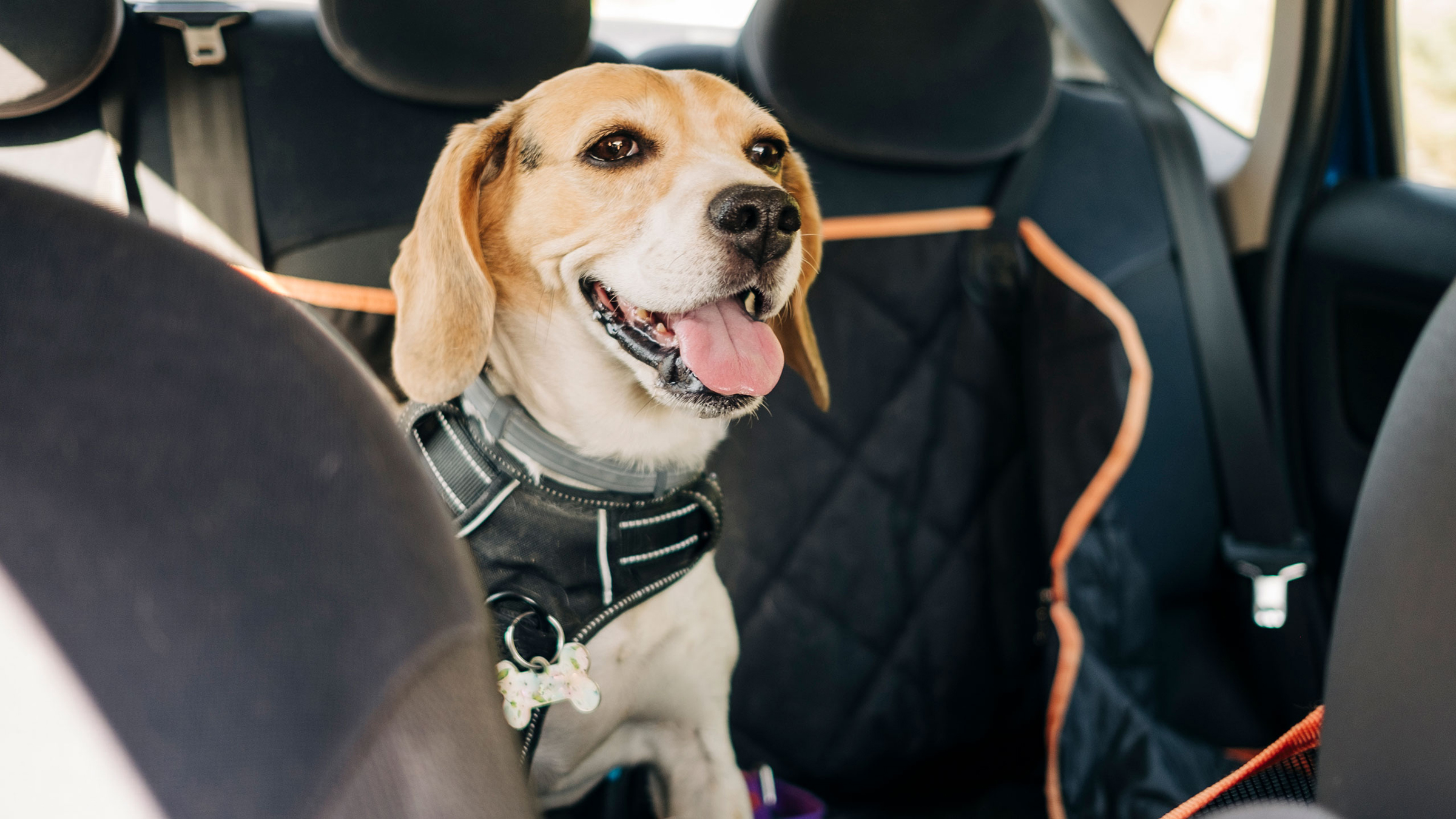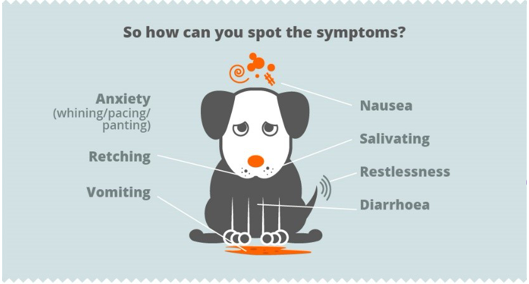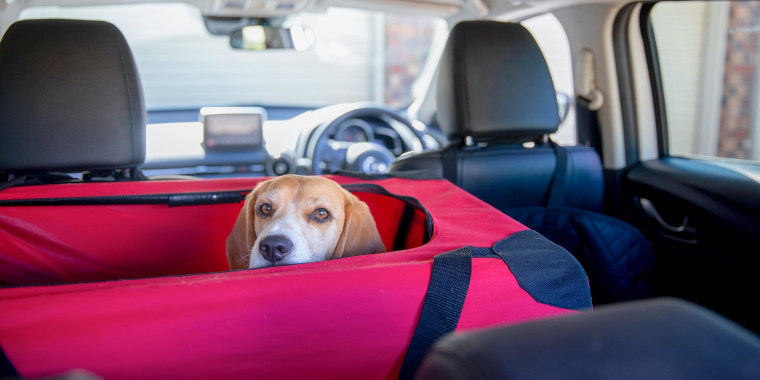At What Age Do Dogs Stop Getting Car Sick? Unveiled
Dogs typically stop getting car sick by the age of one year. Some dogs might outgrow it sooner, around six months.
Car sickness in dogs is a common issue, especially among puppies. Young dogs often experience motion sickness due to their inner ear structures not being fully developed. As dogs mature, their balance improves, and car sickness usually subsides. Early positive travel experiences can also help reduce the likelihood of car sickness.
Ensuring a comfortable journey and gradually increasing travel time can aid in this transition. For persistent cases, consulting a veterinarian is advisable. Understanding and addressing car sickness in dogs not only improves their comfort but also makes travel more enjoyable for both pets and owners.
:strip_icc()/cure-puppy-car-sickness-2804799-hero-540f3dd25a7e4df78ccabcf1e3d47877.jpg)
Credit: www.thesprucepets.com
Introduction To Canine Car Sickness
Many dog owners face the challenge of car sickness in their pets. This issue can turn a fun trip into a stressful experience. Understanding car sickness in dogs is the first step to helping them. Puppies are more likely to suffer from motion sickness than adult dogs. Their inner ear structures are not fully developed. This development affects their balance and can lead to nausea during car rides.
Common Symptoms Of Car Sickness In Dogs
Dogs show various signs when they are car sick. Knowing these symptoms can help you take action quickly. Here are some common symptoms:
- Excessive drooling
- Whining or crying
- Yawning frequently
- Vomiting
- Lethargy
- Panting heavily
If you see these signs, your dog might be experiencing car sickness. It is important to address the problem to ensure their comfort.
Factors Contributing To Car Sickness
Several factors contribute to car sickness in dogs. Understanding these can help you manage and reduce their discomfort.
| Factor | Description |
|---|---|
| Age | Puppies are more prone to car sickness due to their developing inner ear structures. |
| Anxiety | Nervous dogs are more likely to get car sick due to stress and fear. |
| Previous Experiences | Bad past experiences in cars can make dogs anxious and prone to motion sickness. |
| Health Issues | Underlying health problems can also contribute to car sickness in dogs. |
Addressing these factors can help reduce the likelihood of car sickness in dogs. Knowing what contributes to the problem can make car rides more enjoyable for your pet.

Credit: www.goodrx.com
Age And Its Impact On Canine Car Sickness
Many dog owners wonder at what age their furry friends stop getting car sick. Understanding this can help make travel more comfortable for everyone. Age plays a significant role in canine car sickness. Puppies are more prone to motion sickness, while mature dogs often experience it less frequently. Let’s explore how age affects car sickness in dogs.
Puppyhood And Motion Sickness
Puppies are more likely to suffer from car sickness. Their inner ears are still developing. This development imbalance can lead to dizziness and nausea. Most puppies outgrow motion sickness by six months to one year.
Common symptoms of puppy car sickness include:
- Drooling
- Whining
- Vomiting
Young dogs may also show signs of anxiety. They might become restless or cry during car rides. It’s essential to be patient and understanding during this phase.
Maturity And Decreased Incidence
As dogs mature, their inner ear development completes. This reduces the incidence of car sickness. Most adult dogs experience fewer symptoms or none at all.
Factors contributing to reduced car sickness in mature dogs:
- Stable inner ear function
- Increased familiarity with car rides
- Less anxiety and nervousness
Some dogs may still experience occasional car sickness even as adults. In such cases, it helps to consult with a veterinarian. They can offer solutions to make travel more comfortable.
Knowing how age impacts car sickness can assist in planning better travel experiences for your dog. It also helps in understanding the phase they are in and how to support them.
Critical Developmental Milestones
Understanding when dogs stop getting car sick involves recognizing their critical developmental milestones. These stages play a significant role in a dog’s ability to adapt to car rides. Early experiences and consistent exposure can make a big difference.
Socialization And Exposure
Socialization is essential for a puppy’s growth. It involves exposing them to various environments and experiences. Between 3 and 14 weeks, puppies are more receptive. During this period, introduce them to car rides. Short, positive trips can help them adjust.
Exposure to different stimuli can reduce anxiety. Gradually increase the length of car rides. Use treats and praise to create positive associations. Frequent, short trips work better than long journeys.
Habituation To Car Rides
Habituation means getting used to new experiences. Start with short, stationary car sessions. Let your dog explore the car while it’s parked. This helps them feel safe and comfortable.
Next, introduce short rides around the block. Gradually increase the duration. Consistency is key. Maintain a calm and reassuring environment. Use a comfortable crate or harness for safety.
| Age | Activity | Goal |
|---|---|---|
| 3-14 weeks | Short, positive car rides | Early socialization and exposure |
| 14 weeks – 6 months | Gradual increase in ride duration | Build comfort and reduce anxiety |
| 6 months – 1 year | Longer, routine car trips | Complete habituation |
Following these milestones can help most dogs overcome car sickness by their first year. Every dog is different, so patience is essential.

Credit: hounslowvets.co.uk
Breed Predispositions To Car Sickness
Understanding breed predispositions to car sickness can help pet owners manage and prevent their dog’s discomfort. Some breeds are more prone to motion sickness due to their unique characteristics. Knowing these tendencies can make car trips more enjoyable for both dogs and their owners.
Breed-specific Sensitivities
Different breeds exhibit varying levels of sensitivity to car sickness. Smaller breeds often show higher susceptibility to motion sickness. This can be due to their size and inner ear development.
Here is a table highlighting some breeds that are more prone to car sickness:
| Breed | Susceptibility |
|---|---|
| Yorkshire Terrier | High |
| Bichon Frise | Medium |
| Bulldog | High |
| German Shepherd | Low |
| Golden Retriever | Low |
Anatomy And Motion Sickness
The anatomy of a dog plays a significant role in their susceptibility to car sickness. Dogs with shorter snouts, like Bulldogs, often have more issues with motion sickness.
This is due to their inner ear structure and the way their equilibrium is maintained. The inner ear is crucial for balance, and any discrepancies can lead to nausea and vomiting.
Here are some key anatomical factors that influence car sickness:
- Inner ear development
- Snout length
- Overall size and build
Understanding these factors can help in managing and preventing car sickness in dogs.
Training Techniques To Alleviate Car Sickness
Car sickness in dogs can be a frustrating problem for both pets and owners. Training techniques can help dogs feel more comfortable during car rides. This section explores effective methods to alleviate car sickness.
Desensitization Exercises
Desensitization exercises can help dogs get used to car rides. Start with short trips around the block. Gradually increase the duration as your dog becomes more comfortable. Use these steps to help:
- Begin with the car parked in your driveway. Let your dog explore the car.
- Sit in the car with your dog. Turn the engine on and off without moving.
- Take short trips. Gradually extend the length of each trip.
Patience is key. Take it slow and watch for signs of discomfort. Repeat each step until your dog is relaxed.
Positive Reinforcement Strategies
Positive reinforcement can make car rides more enjoyable for your dog. Use treats and praise to create positive associations with car travel. Here are some strategies:
- Give treats and praise before getting into the car. This creates a positive link with the car.
- Reward your dog during the ride. Use treats to keep them calm and happy.
- End each trip with a fun activity. Go to a park or play with a favorite toy.
Consistency is important. Always use positive reinforcement to build good habits. Over time, your dog will start to look forward to car rides.
Medical Interventions And Remedies
Does your dog get car sick? Don’t worry, there are solutions. Medical interventions and remedies can help your furry friend. Let’s explore some options that can make car rides enjoyable for both of you.
Over-the-counter Solutions
Sometimes, simple over-the-counter solutions can work wonders. Here are a few:
- Ginger Supplements: Ginger is a natural remedy for nausea. You can find ginger supplements in pet stores.
- Benadryl: This common antihistamine can also help with motion sickness. Always consult your vet for the right dosage.
- Pressure Wraps: These wraps apply gentle pressure, calming your dog during car rides.
Prescription Medications
If over-the-counter solutions don’t work, your vet can prescribe stronger medications. Here are some options:
| Medication | Purpose |
|---|---|
| Cerenia | Prevents nausea and vomiting in dogs. Safe for long-term use. |
| Acepromazine | Reduces anxiety and motion sickness. Use with caution as it can cause drowsiness. |
Always consult your vet before giving any medication to your dog. Your vet will advise on the best option based on your dog’s health and age.
Role Of Diet And Feeding Schedules
Understanding the role of diet and feeding schedules can help manage car sickness in dogs. Adjusting what and when your dog eats before a car ride can make a big difference. Proper hydration is also crucial for minimizing travel discomfort.
Pre-ride Dietary Considerations
Feeding your dog the right food before a car ride is essential. Avoid giving them a large meal right before the trip.
- Small Meals: Feed your dog a small meal 3-4 hours before the ride.
- Avoid Rich Foods: Do not give them rich or fatty foods.
- Easy to Digest: Opt for easily digestible foods to prevent stomach upset.
| Time Before Ride | Recommended Action |
|---|---|
| 3-4 hours | Feed a small, light meal. |
| 1 hour | No food; ensure hydration. |
| 30 minutes | Allow a bathroom break. |
Hydration And Car Rides
Keeping your dog hydrated is just as important as feeding them the right food. Ensure they have access to water, but don’t let them drink too much right before the ride.
- Steady Access: Provide water regularly, but in small amounts.
- Travel Bowls: Use travel-friendly bowls to avoid spills.
- Frequent Breaks: Stop for water breaks during long trips.
Proper hydration helps keep your dog comfortable and reduces the risk of car sickness. Remember, a well-hydrated dog is a happier traveler.
When To Consult A Veterinarian
It’s common for puppies to get car sick. Most dogs outgrow it. But sometimes, car sickness persists. If this happens, it’s important to know when to consult a veterinarian.
Chronic Car Sickness
Chronic car sickness is a concern. If your dog continues to feel sick after many car rides, consult a veterinarian. They can check for underlying issues.
The vet might suggest medication. This can help ease your dog’s discomfort. Some dogs need motion sickness medication.
Behavioral training is another option. The vet can recommend ways to make car rides easier. Sometimes, small changes can make a big difference.
Other Health Concerns
Car sickness can be a sign of other health problems. Inner ear issues can cause balance problems. These can make your dog feel sick in the car.
Anxiety is another concern. Some dogs feel anxious during car rides. This can cause vomiting and drooling. A vet can help manage your dog’s anxiety.
Digestive problems can also cause car sickness. If your dog has frequent stomach issues, a vet can help. They may suggest diet changes or tests.
| Sign | Possible Cause | Consult a Vet? |
|---|---|---|
| Frequent Vomiting | Chronic Car Sickness | Yes |
| Balance Issues | Inner Ear Problems | Yes |
| Excessive Drooling | Anxiety | Yes |
| Stomach Problems | Digestive Issues | Yes |
Always observe your dog’s behavior. If you notice any of these signs, consult a veterinarian. They can provide the best care for your dog.
Case Studies And Success Stories
Many dog owners worry about their pets getting car sick. It’s common, especially in puppies. But at what age do dogs stop getting car sick? Let’s explore some case studies and success stories to understand this better.
Recovery Journeys
Max’s Journey: Max, a 6-month-old Labrador, often got car sick. His owners tried various methods to help him. They took him on short, frequent car rides. They also kept the windows slightly open. By the age of 1, Max had stopped getting car sick.
Bella’s Progress: Bella, a 4-month-old Beagle, had a similar issue. Her owners used ginger treats to ease her nausea. They also made sure she faced forward during car rides. Bella outgrew her car sickness by 9 months.
Long-term Adaptation
Charlie’s Experience: Charlie, a 1-year-old Golden Retriever, struggled with car sickness for a long time. His owners consulted a vet. They used anti-nausea medication for long trips. By the age of 2, Charlie no longer needed the medication. He adapted well to car rides.
Luna’s Transformation: Luna, a 2-year-old Poodle, had severe car sickness. Her owners tried motion sickness bands. They also played calming music during car rides. Over time, Luna adjusted. She enjoyed car rides without any issues.
| Dog Name | Breed | Age When Car Sickness Stopped | Methods Used |
|---|---|---|---|
| Max | Labrador | 1 year | Short rides, Open windows |
| Bella | Beagle | 9 months | Ginger treats, Facing forward |
| Charlie | Golden Retriever | 2 years | Anti-nausea medication |
| Luna | Poodle | 2 years | Motion sickness bands, Calming music |
Conclusion: Journey To A Calmer Ride
Dogs, much like humans, can suffer from car sickness. This issue can make travel stressful for both dogs and their owners. Understanding at what age dogs stop getting car sick can greatly improve the quality of your journeys. Let’s dive into the key takeaways and offer some encouragement for dog owners.
Summarizing Key Takeaways
Car sickness in dogs often stems from a combination of motion and anxiety. Puppies are more prone to car sickness due to their developing inner ear structures. This usually improves as they grow older.
| Age Group | Car Sickness Likelihood |
|---|---|
| 0-6 months | High |
| 6-12 months | Moderate |
| 1 year and older | Low |
Most dogs outgrow car sickness by the age of 1 year. Older dogs can still experience it, but this is often due to anxiety rather than motion sickness.
Encouragement For Dog Owners
There are many ways to make car rides more comfortable for your dog:
- Gradual exposure: Start with short trips and gradually increase the duration.
- Comfort items: Bring their favorite toy or blanket.
- Proper ventilation: Ensure the car is well-ventilated.
- Frequent breaks: Stop regularly to let your dog stretch and relieve itself.
Using these tips can help your dog feel more at ease during car rides. Remember, patience and consistency are key. A calmer ride for your dog means a more enjoyable journey for you both.
Frequently Asked Questions
Will A Dog Outgrow Car Sickness?
Yes, many dogs outgrow car sickness as they age. Puppies are more prone to it. Gradual exposure helps.
Can A Dog Be Cured Of Car Sickness?
Yes, a dog can be cured of car sickness. Gradual desensitization, medications, and proper ventilation help alleviate symptoms.
How Can I Tell If My Dog Gets Carsick?
Your dog may get carsick if it drools excessively, whines, vomits, or appears restless during car rides.
How To Desensitize A Dog To Car Rides?
Start with short, calm car rides. Gradually increase the distance. Use treats and praise for positive reinforcement. Ensure the car is comfortable. Repeat regularly to build familiarity and reduce anxiety.
Conclusion
Understanding when dogs stop getting car sick can help owners plan better trips. Most dogs outgrow car sickness by age one. Training and gradual exposure can also reduce symptoms. Always consult your vet for personalized advice. Happy and stress-free travels make for a healthier, happier pet.
- Can I Get in a Taxi Without a Car Seat? - January 26, 2025
- Can I Get Chlamydia From a Toilet Seat? - January 26, 2025
- Can I Get an Uber With a Car Seat? - January 26, 2025






